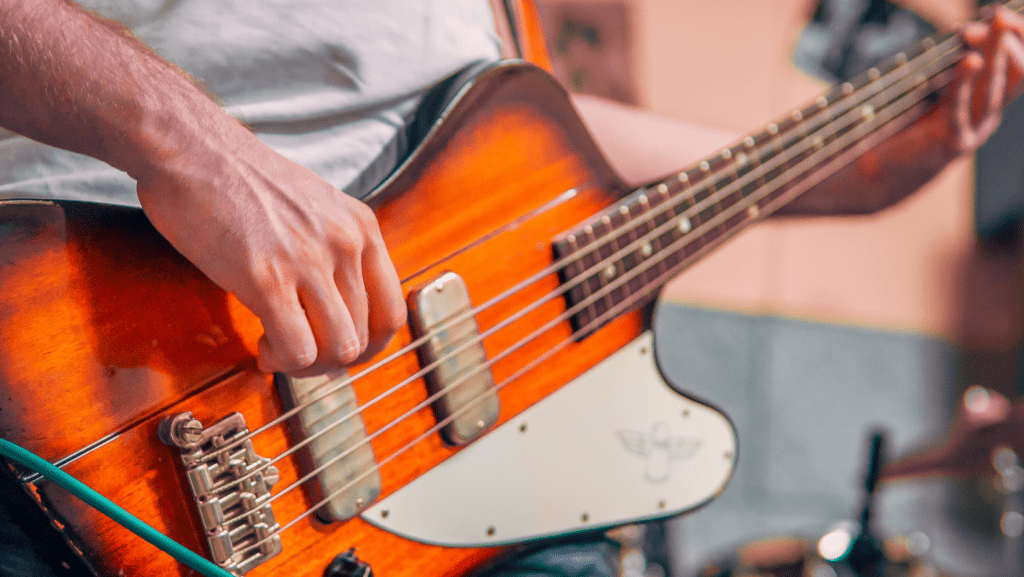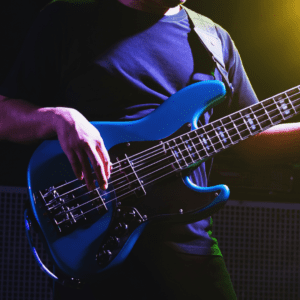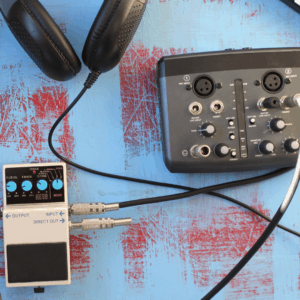
The bass is an instrument that often gets shaded out by its more illustrious and ‘sexy,’ cousin, the guitar. However, if you’re a fan of popular music, then chances are your ear is accustomed to the ever-present sound of the bass guitar. The bass provides the backbone, along with the drums, of many popular musical genres. In a sense, the bass guitar is often the musical glue that holds many of our favorite songs together.
So if you’ve taken a noble step and decided you want to start learning the bass, you may be wondering how and where to begin. If this is you, then read on for tips on how to learn this important instrument.
There’s no easy answer to how long it’ll take you to learn the bass guitar. It can depend on a variety of factors, including how good you want to get/what you want to learn, previous musical experience, and plain old natural ability. Even though you are new to any instrument, you could easily learn the basics of the bass guitar in 6 months to a year.
Factors That Affect How Long You May Take To Learn The Bass Guitar
Define What Learning The Bass Guitar Means To You
How long it takes you to learn the bass will depend on the type of genre that you want to play. Certain genres where the bass plays a prominent role, such as funk, will be harder than other genres where the bass plays more of a supporting role.
Basslines over simple 3 chord pop songs shouldn’t take too much time or effort to learn. You just have to be sure to learn your scales well. Moving into heavier or classical rock might take some more time to learn, as there could be more complex chord changes and different time signatures to play in.
Let’s not even talk about jazz.
Previous Musical Experience
Whether or not you have any previous musical experience will likely affect how long it will take you to learn how to play the bass. People with previous musical experience will most likely learn the basics of the bass guitar quicker than complete beginners. People who have previous experience with other stringed instruments, like the guitar, mandolin, ukulele, banjo, etc will likely be at an advantage here as well.
Dedication
Someone who really wants to learn bass will do so much quicker than someone whose heart is only half in it. The amount of time you put into learning the bass will decide how quickly you’ll see results. With learning instruments, there’s a lot of muscle memory that’s involved, and the bass guitar is no different. Even if you’ve played guitar, ukulele, or some other string instrument before, you’ll have to gain new muscle memory for the bass guitar.
The longer you go without picking up your bass, the harder it’ll be to build those new neural pathways you need. Learning the bass is a skill that requires constant practice.
Key Areas To Focus On When Learning Bass
Let’s say your goal is to play simple bass lines, then let’s look at some things you could focus on.
1. Learn The Fretboard
Learning the fretboard is one of the most important things you can do on the bass. Unlike on the (lead) guitar, you’ll most likely be playing single-note bass lines as opposed to chords on the bass. Therefore it’s imperative that you learn the fretboard so you can orient yourself and play in the right key when you jam with other musicians.
To do this, you may have to learn some basic music theory. Whilst this is not so important when you’re just beginning, having some basic music theory knowledge will help things make more sense. It’ll also allow you to add more variety to your playing.
Remember the point of music theory is to compliment your playing and nothing else.
2. Scales
Learn scales like you would learn chords on the guitar or ukulele. Learning scales is how you’ll be able to play along with the chord progression that your fellow musicians are playing in.
Learning all the major and minor scales is a good place to begin. Make sure you really have them embedded in your memory before you move on to further study.
But it’s essential first that you nail down the basics, as this is what the vast majority of songs will be played in.
3. Groove & Timing
The bass guitar is key to keeping the groove along with the drums in many types of music. Consequently, you’ll want to make sure you develop a good sense of rhythm, as if you start playing with other musicians, they’ll be counting on you alongside the drummer to keep the tempo tight.
Practicing with a metronome is a good way of ensuring that you’re keeping tempo when you’re practicing alone. Doing this regularly will help engrain keeping time into your musical brain, and make it second nature to you.
4. Fingerpicking vs Using a Pick
Some people prefer their bassist to use a pick rather than fingerpicking. The idea is that the attack is more constant this way. Fingerpicking gives more of a human and perfectly imperfect sound.
However, modern music has seen a preference for highly polished and ‘perfect,’ sounding music in the previous decades, so it may be an idea to know how to use a pick on bass anyway, so you have this skill up your sleeve should you need it.
5. Special Techniques
Slap The Bass
Slapping the bass is a technique specific to the bass and has a very specific sound and feel to it. Slapping involves striking the bass string with your thumb. It’s often then followed by a ‘pop’ with the fingers of the right hand. It gives a specific percussive element to your playing.
The technique is often credited to Larry Graham of Sly and the Family Stone, who stated he invented the technique at a time when they didn’t have a drummer to add a percussive element to the band’s music. The ‘slap and pop,’ was meant to emulate the kick and snare drums, and add some extra groove to the sound of the electric bass.
Larry Graham did a lot to revolutionize the technique and cement the bass’s role in the rhythm section through the ’60s and ’70s. However, it was double bass players in the New Orleans jazz scene who can be credited with the ‘invention’ of the technique. Bassists like Flea from the Red Hot Chili Peppers can be thanked for bringing the technique into the ’80s, 90s, and beyond.
Frequently Asked Questions
What Is The Bass Guitar?
The electric bass is essentially a four-stringed instrument, usually tuned like a double bass or the first four strings of a guitar. It forms part of the rhythm section in modern rock or popular music bands. As such is an integral part of modern musical ensembles.
Is The Bass Harder To Learn Than The Guitar?
Learning the very basics of the bass is easier than the guitar. If you want to learn how to play simple, single-note bass lines to play along with a band, then many people will often find this easier than learning the basics of the guitar. Total mastery, however, will take years.
Some people assume that the bass is easier to learn than the regular guitar as it has fewer strings. Whilst this may be true, there are specific techniques for the bass guitar that aren’t necessarily transferable from the guitar.
One benefit of learning the bass is that you are less likely to have to learn as many chords as you would if you wanted to learn the regular guitar. Many bass players at first will be content learning notes and scales, as strumming chords isn’t as common.
If I Already Know The Guitar, Will I Find Learning The Bass Easier?
Previous knowledge of the guitar will help you in learning the bass. However, they are different instruments and do require slightly different techniques. As the bass is bigger, it will also require different muscle memory than the smaller frets of the guitar.
If you play guitar then you are already familiar with how each fret corresponds to a semi-tone. This is the same on the bass guitar. The only difference is the stretch between each note is bigger (as the lower frequency of the note needs more space to vibrate) So whilst in theory knowledge of the guitar is transferable to the bass, the physical act of playing requires new training.
Also if you normally just strum chords on a guitar, then this isn’t really transferable to the bass, where you’ll usually be playing single-note bassline and not strumming chords. However, if you play lead guitar or fingerstyle, then you may find learning the bass easier as you may already know your scales.
How Often Should I Practice The Bass?
Consistency is key. It’s better to play a little bit every day than, say, doing all your practice on the weekend.
Learn your scales in all the major and minor keys. Practice with a metronome. Once you’ve really learned to play in different keys, you’ll be surprised how many songs you can play. Play as many different songs as you can in as many different styles as possible. This helps you become more versatile as a musician.
Once you’re able to play competently, you may want to find a group of people to play with. The more often you play with different people, the more you’ll grow as a musician. You’ll gradually get to know the idiosyncrasies of playing with other people, as well as learning from them.
Do I Have To Know Any Music Theory To Play The Bass Guitar?
Whilst you don’t have to know any music theory to play the bass guitar, having some basic knowledge of theory will vastly improve your playing. For example, knowing the circle of fifths, knowing your major keys from your minors, along much more will help your overall musicality. “Music Theory for the Bass Player” is a very well-written book if you want to dive deeper into this topic.
What Do You Need To Play Bass Guitar?
To play bass you’ll need an amp, cables, picks, a tuner, headphones, and extra strings. A travel case for your bass is also a good idea if you’re planning on taking your bass around with you.
The good thing about many of this gear is that it can be shared between instruments, so you may already have some of this if you play guitar or another string instrument. If you don’t you’ll be able to share them if you decide to pick one up at a later date.
How To Tell The Difference Between Bass And Electric Guitar?
A bass guitar is larger than a typical electric or acoustic guitar. A guitar typically has six strings whereas a bass usually has four. Bass has a much lower frequency of notes available to them than the guitar.
How Many Frets On A Bass Guitar?
A standard bass guitar, following Fender’s lead, has 20 frets. Modern bassists will sometimes have extra frets and strings, but above a certain point, notes stop being bass notes and become mid or even high-frequency notes.
Practice Tips For Beginners
1. Learn The Most Common Scales and Keys
Make sure you know the most common keys and scales in the genre you like to play in. Being able to seamlessly change chords is one of the most important skills for a bass player to develop.
It’ll allow you to jam with others, and follow the chord changes of the guitarist and other musicians.
2. Train Your Ear
A vital skill for any musician is having a good ear. Being able to hear different chord changes, whether a song is in a major or minor key, being able to hear the groove of a song, are all vital skills that you need to develop.
The easiest way is to listen to music, lots of music! The more diverse the type of music you listen to the more you’ll be able to pick up on different chords, key changes, and rhythms. There are ear training courses and apps you can buy also if you want a more formalized approach too.
3. Master The Basics
Learning how to smoothly change chords alongside the other musicians you’ll be playing with is a vital skill to master. It’ll help make sure that the music you’re working on as a band will sound good and cohesive. Building strong foundations from the beginning is vital if you want to grow and develop over time.
4. Use A Metronome
As a bass player, you become part of the rhythm section of the band. As such, other members of the ensemble will look to you to keep steady time. As easy as this may sound, it’s easy to get carried away, especially in a live setting with all the energy of the event.
Keeping solid time is a vital skill for a bass player to learn and is a muscle that has to be trained. Using a metronome when you practice will help you internalize the groove of what you’re playing and help you grow over time as a musician.
5. Sometimes Less Is More
Some of the best bass players are the ones who show a lot of reserve in their playing. Sometimes the best music lies in between the notes, in what is left unsaid (or unplayed)
The Bottom Line
Bass players are always needed. Whatever it is that draws you to playing the bass guitar, learning this instrument is a journey and you should try and enjoy every step of it. Whilst you should be able to play basic bass lines within 6 months to a year, mastery of this instrument (indeed any instrument) will take years if not a lifetime.
Make sure to go step by step and don’t jump ahead. Not only will this help with your motivation and stop you from getting discouraged, but it’ll ensure that you don’t miss any skills and techniques down the line.




